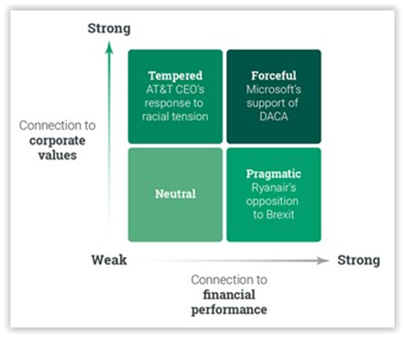Communications firm Ruder Finn's "CEO activism: should leaders speak up about social causes?" (Board Agenda) offers seasoned perspective on factors (accompanied by relevant examples) that CEOs should consider when contemplating whether to speak out publicly on a social issue - an increasingly common occurrence.
- When it is authentic, i.e., resonates with the business objective or the CEO’s personal story or the CEO has committed to making a change within the company related to that issue
- To connect with a growing millennial workforce, whose loyalty and engagement commonly depend on personal engagement
- Because it’s the right thing to do for the future of the company based on how an increasingly vocal workforce believes the company should behave or respond in order to "do the right thing"
Late last year, we floated (see "Political & Social Issues") this still very relevant logical decision-making framework from Insead for determining whether and how CEOs should speak out on political or social issues, which are by their nature often controversial and thus carry the potential to resonate with some and alienate others:
As illustrated, the framework reflects consideration of the nature and strength of the relationship of the issue at hand to the company's values and financial performance. Among other things, the framework supports disciplined decision-making and consistency over time.
Access numerous additional resources on our Risk Management & Oversight, Corporate Culture, Racial Equality & Diversity, Workforce Management and Sustainability/ESG pages. This post first appeared in the weekly Society Alert!